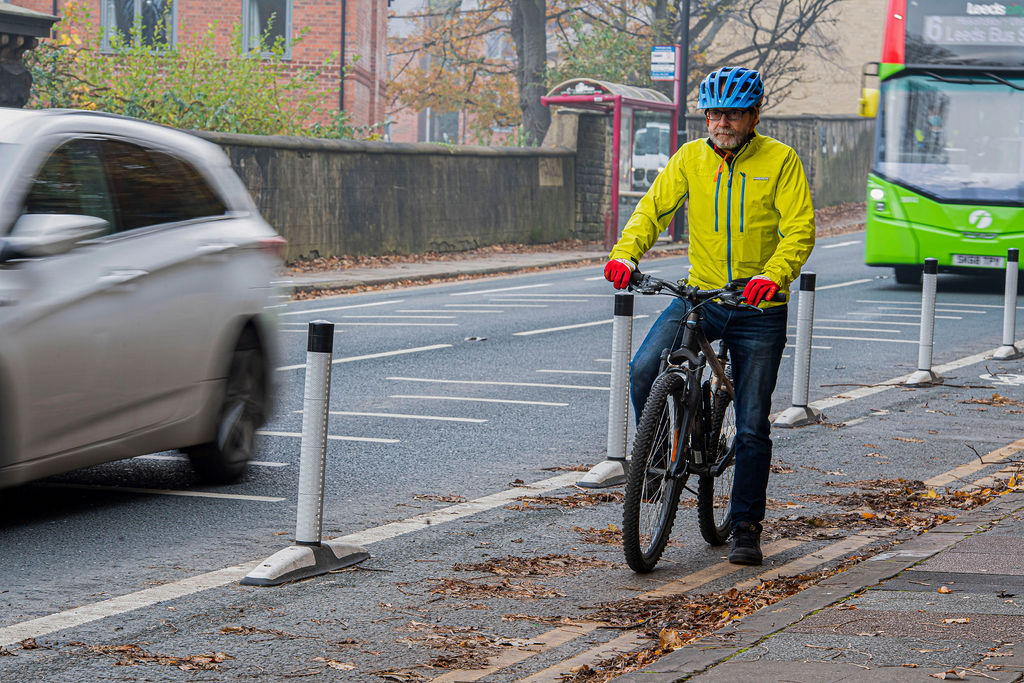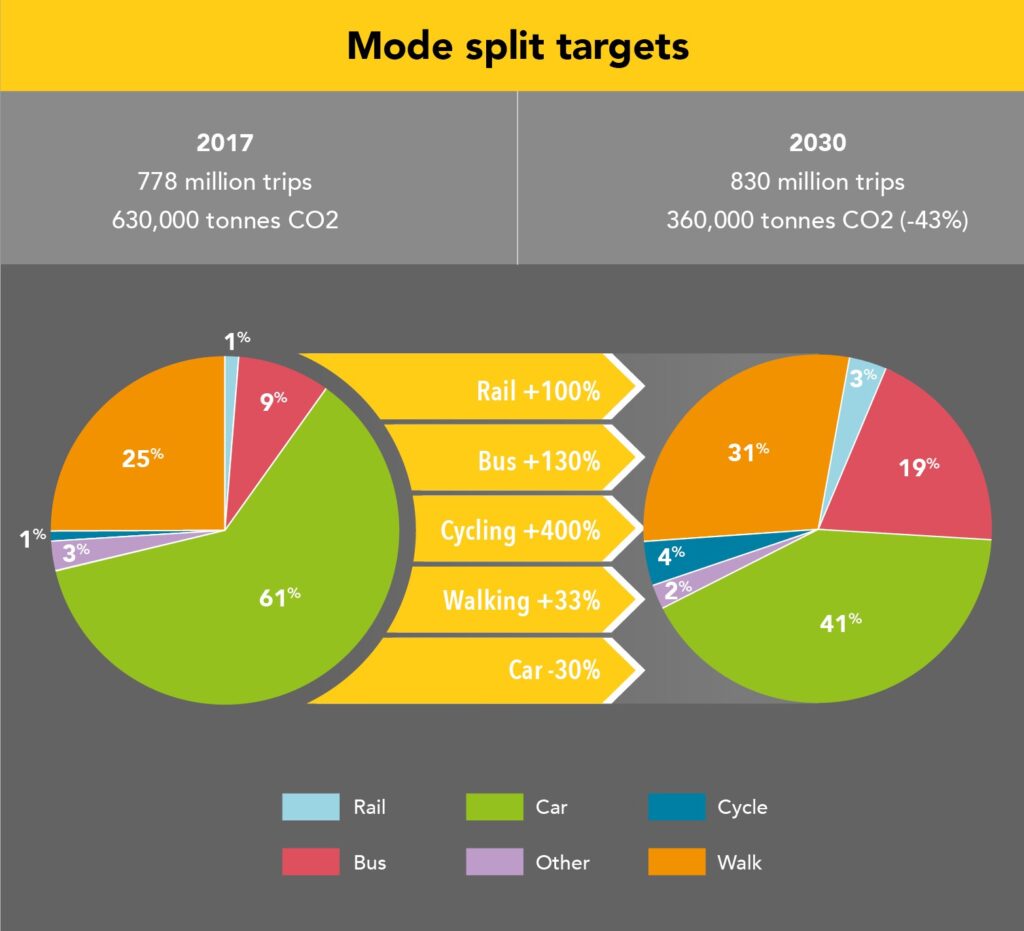
Universal access to accessible, affordable and sustainable travel choices is the promise of a new transport plan for the city.
Leeds City Council’s draft ‘Connecting Leeds Transport Strategy’ aims to tackle the climate emergency, deliver inclusive growth, and improve the health and well-being of Leeds residents.
The six ‘big moves’ outlined in the strategy act as an action plan to create a people-first, affordable and integrated transport network across the city that isn’t reliant upon the private car.
The integration of more walking and cycling into our daily travel habits alongside the enhancement of public transport will help to reduce congestion, continue to improve air quality and lessen the impact on the environment when accessing education, employment, leisure opportunities and local services.
Creating healthier streets and communities is key to the improvement of the physical health and mental wellbeing of people living in, working in and visiting the city. It aligns with the ambition to achieve a net-zero carbon target by 2030 as well as deliver a low carbon mass transit network in partnership with the West Yorkshire Combined Authority.
To enable everyone to participate and help shape the Connecting Leeds transport strategy, a city-wide consultation is underway.
The background and ambitious targets for the transport strategy means working towards our Climate Emergency carbon targets by 2030 and Vision Zero for no one to be killed or seriously injured on our roads by 2040. Also by 2030, travel mode choices need to change to meet these targets – as shown by the diagram.
Councillor Lisa Mulherin, Leeds City Council’s executive member for climate change, transport and sustainable development, said:
“The Covid-19 pandemic has brought about fundamental changes to how we live, work and enjoy our city.
“The draft Connecting Leeds Transport strategy sets out ways in which we can improve the health and wellbeing of our communities with cleaner air and healthier streets.
“Moving our transport system towards a more accessible, active travel and public transport focused network, will allow us to achieve the Connecting Leeds vision of a city where a car is not required to meet mobility needs.
“We know that people are willing to make a switch to electric vehicles, use public transport more, reduce trips by car and walk, wheel or cycle for shorter journeys. But achieving net zero carbon by 2030 will require even bigger changes.
“As we begin the recovery from the Covid pandemic and focus on our aims to tackle the climate emergency and improve our health and wellbeing, every one of us needs to play our part in making the shift from over-reliance on the private car to public transport, walking, cycling and shared use of vehicles.”
You can have your say on the issues at leedstransportstrategy.commonplace.is the consultation closes on Friday 5 March 2021.
This post is based on a press release issued by Leeds City Council




It’s a brilliant idea building cycle routes Through out Leeds however it is annoying when you see a cyclist on the road and not in the specially built lanes. Shouldn’t the law work both ways powered vehicles are not allowed on cycle paths so cyclist should be forced to used cycle lanes for their safety and reducing traffic flow by cyclist avoiding the use of there specially built highway
To attract cyclists the Government should give electric bikes/scooters to each person. The only way to get folk out of their cars. Also no mention of Leeds Bradford Airport in the Plan and the need to reduce flights to a minimum. Free Bus travel would also be necessary and a much more frequent service on all routes. Beeston was, like many parts of Leeds, developed as a result of fantastic public, cheap transport from the 1900’s onwards. Time to bring back public transport and move away from private cars.
Aviation only accounts for 2% of global emissions. In the UK it amounts to around 6% of the global 2%. As the 15th largest airport in the UK Leeds Bradford airport contributes far less than 0.5% of UK emissions. The big culprits are road transport, buildings and electricity production.
Leeds Bradford Airport Support Group
We all tend to forget that till the 60’s/70’s people in South Leeds worked mostly locally. In Beeston alone there was the tannery, Rose foregrove , Down Westland road there was Benefit shoes, Massive Peter Pell tailoring, Oddy Engineering, Miles Druce Metals, Leeds Metal spinners. not forgetting miggy pit. to name just a few. All major employers all sadly gone. Nowadays people have to mainly travel longer distances to get to work and a lot of moms have to get the kids to school before work. Electric cars are the way we should be going. It would be stupid and accidents waiting to happen to expect the majority of over 50’s to get on an electric bike or scooter especially in the yorkshire climate. Demonising the car is locking us away and anybody not able to walk as far as the bus stop or get on a bus will be prisoner in their home and unable to go to work. Shopping is one of the few activities left for a lot of elderly and they are being told they should order on line instead of going in their hard worked for car. Another nail in their coffin (they might as well stop in covid lockdown) The mental health for a lot of people in South Leeds is going to be made worse by these implementations. It wont make people healthier it will encourage them to sit and order everything from a chair and be less mobile than ever before. and will become less and less social and more cut off from society. Upsetting and disgusting.
Ms Meikle: it is worth trawling through the draft strategy and other information over the next few weeks, if you can snatch some time. Neither the government nor the local authority aim to do away with or demonise the private motor car, but merely to decrease our dependence on it as a society.
This will help tackle congestion/ traffic jams, improve air quality and health (esp. of children and seniors), and the environment. Be assured that diesel vehicles (buses, Hackney Carriages, HGVs) not petrol vehicles (cars, private hire taxis) are first on the ‘hitlist’.
Absolutely there will be replacement motor vehicles that are quieter, cleaner, more flexible, efficient, convenient, healthier, properly integrated, keenly priced, both timetabled and to order. Electric bicycles, scooters, buses, trains, trams, taxis, and private electric cars.
Most of us will ‘cherry pick’ from several these transport options to suit the situation. – our home location, lifestyle, weather, health or mobility. A large chunk of physical ability is actually ‘use it or lose it’ – plenty of seniors in other parts of Europe or the world are active, flexible, have great balance and strong bones. As you quite rightly note, it would be foolhardy (even masochistic!) to use an e-bike or e-scooter in driving rain, black ice or snow. Private car, taxi, pool or fleet car, modern tram or high-speed train depending where we live – all electric or otherwise low polluting and quiet, warm, comfortable. Decreased dependence on cars, not demonised or done away with.